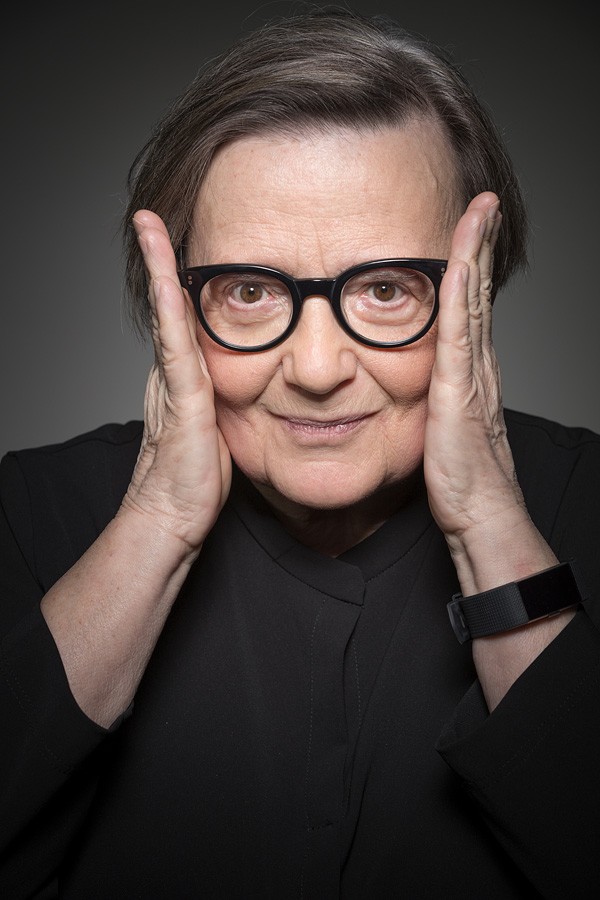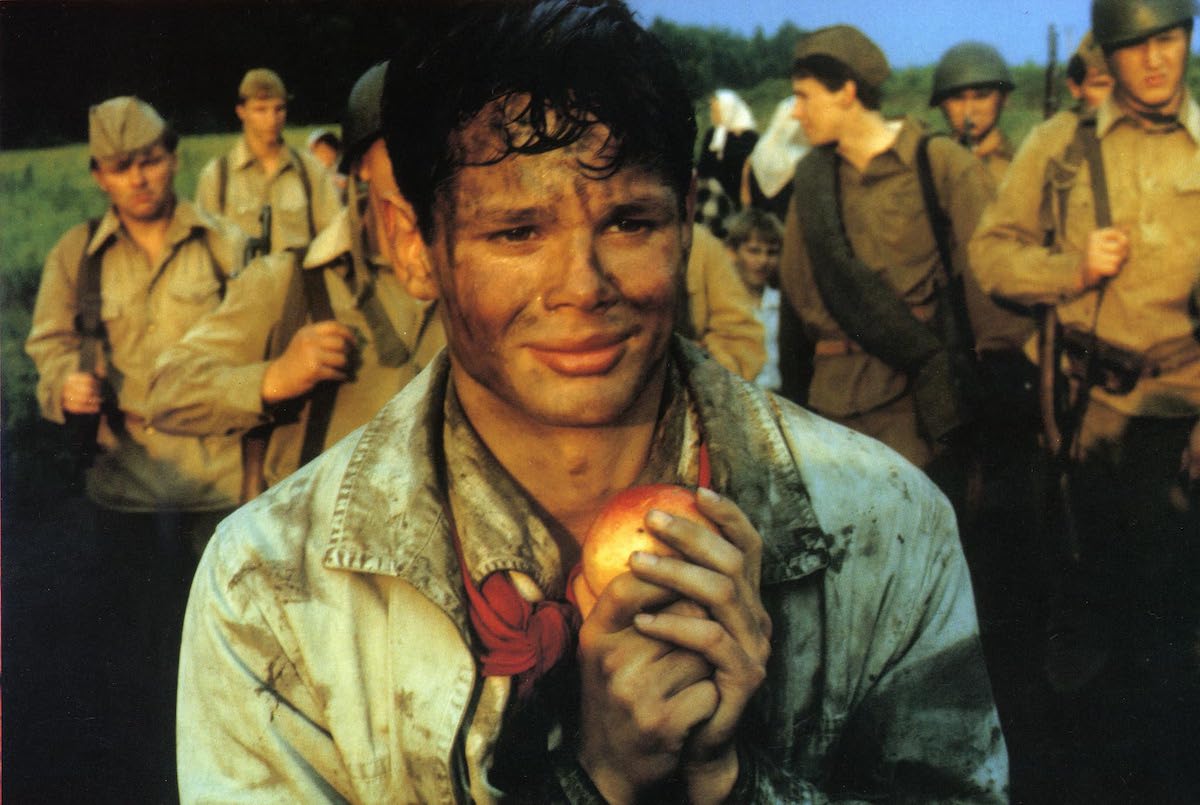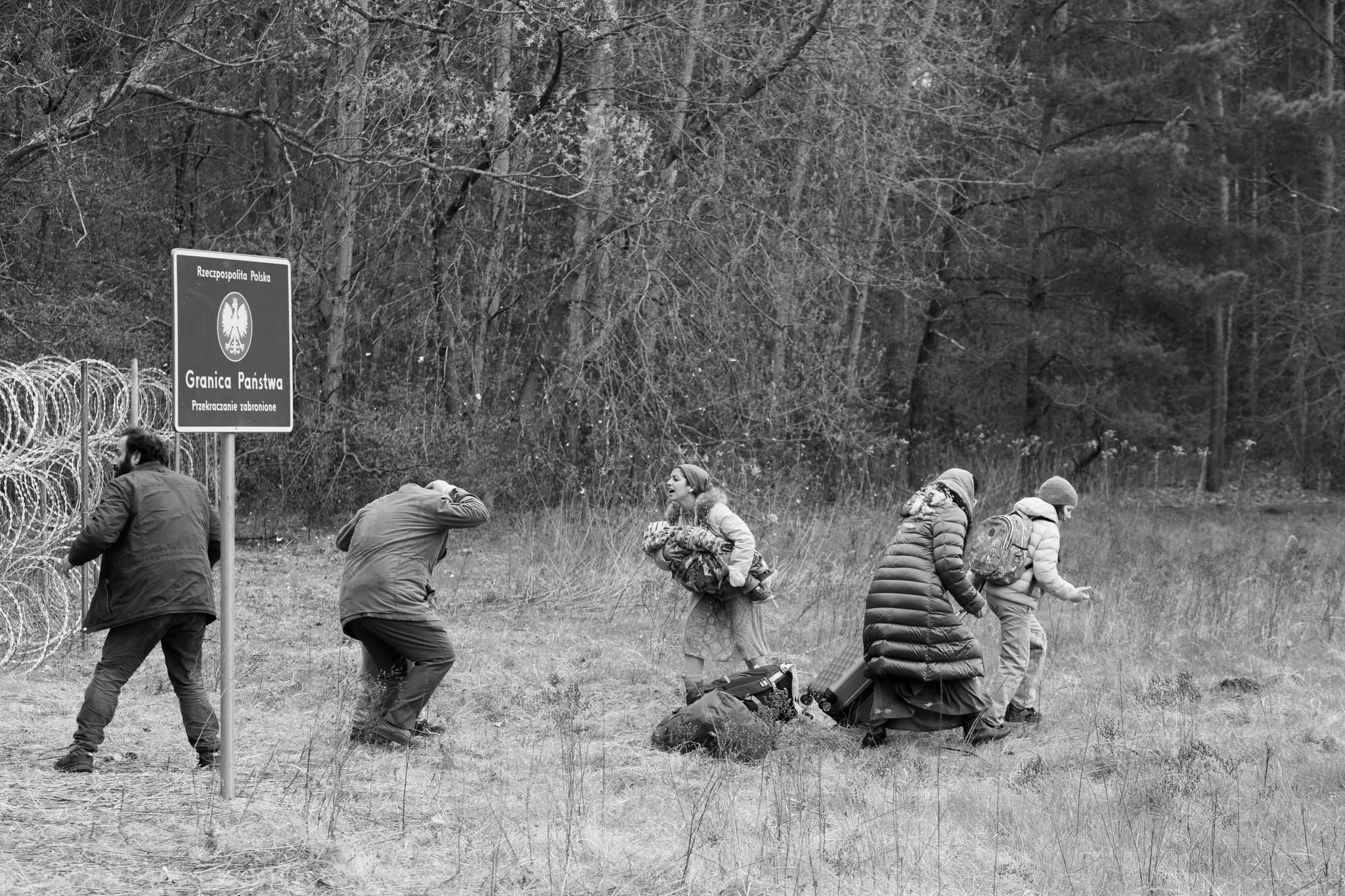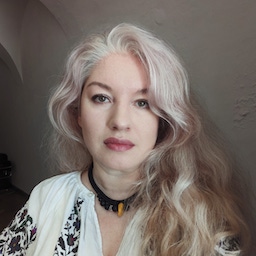Empathy as a response to dark political forces: an interview with Agnieszka Holland
The acclaimed Polish film director Agnieszka Holland has never shied from speaking out against the mechanisms of evil and the erosion of democratic principles. Her latest film, Green Border, is a powerful indictment of the mistreatment of migrants. It triggered strong reactions in Poland. Her work has also long explored the legacy of 20th century horrors in Europe. We reached out to her for a discussion about cinema and activism in times of war and the reemergence of authoritarianism. Hers is a persistent and convincing call for empathy — not as sentimentality, but as a political and moral force in the face of dehumanization.

Vira Baldyniuk: In Ukraine, we often say that with the experience of war, occupation and losses, we have gained a bitter understanding of how societies allow evil to prevail. Do you agree that these mechanisms of evil are still repeated, each time in the same way? Or does evil take on thousands of different faces, in each new era?
Agnieszka Holland: I would call the experience of World War II and the Holocaust an “inoculation” which protected European nations for a certain period of time. From there came the social contract to introduce certain restrictions, regulations, and bans on the use of various types of lethal weapons. Even during the Cold War these regulations were in place to some extent, because there still was an awareness that the approval of imperialism, Nazism, and racism leads to great crimes. But in my opinion, this inoculation has lost its power. What Ukraine is experiencing now is the world's consent to the worst. The mechanisms that led to the Holocaust have become acceptable again.
At first, I was surprised by the West's reaction to the full-scale war in Ukraine. For some reason I was sure that everything would be sluggish, like in 2014. But this time the reaction was stronger, there was a sort of awakening, with the realization that we were all under threat. Yet it's very easy to turn this awakening into fear and hatred, indifference or aggression. We see this in the United States and in European countries, where the answer to the complications of our time is a megalomania of nationalism, with pronouncements like: “We have the right to everything, you have the right to nothing.” I don’t see a good prospect here. The potential for goodness that exists in humanity is not nurtured, nor is it sufficiently supported and promoted by political or cultural authorities. This potential is withering and shrinking.
The new "vaccination" is very painful, and it’s unclear how we will survive it. A new “old” world has arrived, and there’s been talk not only of freezing weapons supplies to Ukraine but also of curtailing development programs, including Ukrainian projects that documented the crimes of this war. How do you assess the changes in the world in this new Trump era? We used to call it populism, but what would you call this new world order?
We can confidently say that this is neo-fascism. The behavior of a number of western leaders is quite consistent; and populists easily unite with neo-fascists, feeling they’re riding a wave that’s taking them to the heights of world domination.
We can see close cooperation and solidarity between them, which is extremely dangerous. Because it’s not only Trump's America, but also China, Fico, Orbán, Ms Maloney, Le Pen in France. In Poland, Law and Justice may return to power in some worse form, more determined, cynical and nationalistic, together with the Confederation.
They all understand that with a weakened European Union, they benefit from real international support. When I use the term "neo-fascism", I’m well aware that it doesn’t convey the complexity of the various processes currently taking place in the world. These ideas have been planted in the soil of social media, algorithms that manipulate public opinion in ways that other media, such as newspapers or television, have never dreamed of. This is a new reality, and I don't know what force could hold it back - except for the citizens of each country. But people are confused, easily susceptible to fear and illusions, and they don't even know when they’re being manipulated. They are afraid and want some kind of hope. The “New World Order” gives most people that hope, saying that America will be great again. But if America is great, and Russia is great, and China is great, and India is great, and even Slovakia is great again (I've heard that), then there will be a war between all the “greats”.
I am very angry at the helplessness, laziness and cowardice of the Democrats. Trump didn’t have to win, his victory wasn’t some kind of fate we had to accept. We didn't have to. If the Democrats and Joe Biden hadn’t fallen prey to megalomania, if they’d communicated differently, if they’d used the same tools as their opponents, only pro-democratically, this wouldn't have happened. In the Polish elections, the coalition's victory showed that, in the end, doom could be overcome. But now, after a year of their work in office, we can ask ourselves whether this government is doing everything possible to prevent that from happening again. I see that it’s not doing everything it can, it is unable to develop a new way of communicating, a new narrative, a new hope.
What we’re experiencing now is a great crisis of hope. In Europe, this is evident in the demographic crisis: women do not want to have children, men don't want to be fathers. It means they don't believe in the future.
They focus on hedonism, on the here and now, on simple solutions. People often satisfy their sensual needs through their love for pets — they are easier and cheaper to care for than children. Deprived of hope due to the climate catastrophe and war, people honestly say: “We can’t bring children into this world.” In this crisis of hope, neo-populist shills offer a false solution. If we analyze the results of the previous four years of a Trump presidency and the legacy of Biden's economic performance, it’s clear that the latter did better. But Democrats aren’t good at selling democracy. People no longer believe in it.
At the same time, Europe should be more united than ever and aware of its role in ensuring peace. Is today's Europe capable of restoring hope to people?
The function of politicians is to offer people some solutions, to give them a sense of perspective, not to fool them with “greatness”. The European Union was helpless in many situations because it wasn’t prepared at all for such situations. We didn’t punish the Hungarians when they began breaking the foundations and values of the EU, we couldn’t stop Kaczynski's laws, which the current Polish government is now trying to fight heroically because all institutions were infected with the PiS virus. This kind of virus has reached the EU, and the question is whether it will be possible to defeat it.
When I see the protests on the streets of Bratislava, I am happy and think that we must never give up. However, the tyrants have learnt a good lesson. People take to the streets in their millions. A week later, there are thousands, and a couple of weeks later, there is no one. So you can just wait it out. Putin, Lukashenko, Kaczynski, and Fico have learnt this. The patience of tyrants is now greater than the stubbornness of communities, and this must change.
Why do you think even Polish politicians who built their image on liberal European values are playing the migrant card? The “Ukrainian issue” is raised more and more often when they think they need to quickly heat up public opinion. We’re becoming “political gold” in some politicians’ games.
Democrats are too lazy to invent something new. They take what has worked well for the right and use it: fear, hostility and contempt for the Other are very effective. Large circles of voters can be quickly united around these tools. In February 2022, with the Russian aggression against Ukraine, Poles reacted to the tragedy unanimously, spontaneously. And it was not a straw man: massive aid lasted for many months, new connections were formed, and all this gave Poles a sense of great pride and satisfaction. They enjoyed being kind. They may have looked at their kindness in a slightly narcissistic way, but it was genuine. It’s clear that such an explosion of human openness cannot be sustained for years. I was still surprised that we had lasted so long at all, I thought everything would calm down much faster. Such activism needs to be constantly nourished, like watering plants. But neither the Polish Church nor the authorities did this.
So now our democratic politicians are resorting to excuses: “We can’t provide unconditional aid to Ukrainians because our society won’t agree to this. And if we hand over this issue to the far right, they’ll make sure that no one will help anyone at all.” They think that by making such statements they’ll gain favor with voters and at the same time preserve the essence of people's solidarity in the face of threats from the right. But this is, of course, an illusion. Because when you adopt the rhetoric and agenda of the right, you introduce it all into the mainstream, and liberals and democrats will never be as strong in nationalism as “true” Polish nationalists, who don’t need to disguise their complex thought structures. So, not only do democrats hurt people and poison their fellow citizens with racism, but they are also act ineffectively — because they don’t play on their own field. I am against this policy. I believe we should speak honestly and truthfully about migrants.
As you know, the topic of Ukrainian migration isn’t entirely an idyll because everyday life begins, and conflicts occur. Brexit in Britain happened in particular because Poles made up a fairly significant proportion of the population, they occupied a lot of space in small towns, and suddenly it turned out that some strangers were sitting next to the British in bars, speaking a foreign language, drinking different beer. It was unbearable for the British. Every day I see people getting annoyed when someone speaks a foreign language on the street or on the tram: the high concentration of 'others' creates tension. On the one hand, we're used to it, but on the other hand, it triggers visceral reactions, a sense of threat and alienation. However, this can be worked with, it needs to be discussed, and there are many good tools to deal with such feelings. None of these tools are currently used in relation to Ukrainians or non-white migrants, neither in Poland nor in other European countries.
So we're talking about ways to study the moods and needs of society and migrants in more depth, so as to do something in urban policies?
Yes, there are many effective tools for building coexistence in societies, and you can borrow from them and construct new pillars. This requires a lot of work and money, and the ability to “sell” it politically, so of course no one wants to deal with this topic. Instead, the easiest phrases are: “migrants are criminals” or “Ukrainians cheat on social assistance and live off Polish children”. It's very simple, one sentence — and it works! That’s why I believe the biggest sin of democratic politicians is their laziness and lack of faith in goodness.
On the topic of self-improvement: recently, there’s been a discussion in Ukraine about how previous generations survived terrible times. Most often, we talk about ourselves as victims of the Russian empire and the Soviet Union. And we often don't talk about how those who remained silent, or who betrayed someone, survived. What work does society need to carry out to understand the complexity of its own history?
There was a time when it seemed that Poles were mature enough to face difficult truths, not just the illusion of themselves. But that time quickly passed. It's like psychotherapy: to get to the truth about yourself, you have to go through a painful process of discovery. Some historians followed this path, but soon encountered resistance from the authorities. Nowadays, a certain image of the Pole is being built again: the eternal victim and at the same time a noble lord who is always right and always helps. Both of these images are a terrible oversimplification and sometimes a deception. But they are easier to sell than the complex truth. Is Ukraine capable of undergoing such a difficult self-examination right now, in the midst of a terrible war? I doubt it. Otherwise, it would testify to the incredible strength of the people. But regardless of whether the majority is ready for this, intellectuals and artists must be ready because they exist not to feed people illusions, but to reveal the complexity of the world.
Then let's talk about what’s difficult. In your film Europa, Europa, the main character, a Jew, like a mythological character, goes through all possible identities and roles. He is forced to swear an oath to Hitler and thus survives the war. The film was released in 1990. Had you already seen Claude Lanzmann's Shoah at that time? How did your film come about - out of an interest in testimonies? And was the audience ready for such a complex view?
Yes, I watched Lanzmann's film right after its premiere in Paris. My film was very successful, which means that the audience had some kind of need, but it was unconscious. For a very long time, Jews were unwilling and unable to talk about the experience of the Holocaust. Only in the late 1970s and early 1980s did memories and testimonies begin to appear. My film was not yet poisoned by the kitsch that later emerged around this topic, I created it unconventionally. I was very worried about how the film would be perceived by Jews because the protagonist is ambiguous, he can be called a conformist. However, it was the multi-leveled nature of Shloma's story that attracted me so much. Hence the title "Europa, Europa" (we shot this film in 1989, at a time of political upheaval).

Europe has a double identity. It is the cradle of high culture, human rights, “liberté–égalité–fraternité” and all that we in its eastern part miss and strive for. At the same time, Europe is the cradle of the greatest crimes against humanity. When I was filming The Green Border, I had the impression I was filming Europa, Europa 2. In any case, Jews all over the world received Europa, Europa very well, and I travelled with the film to different countries for author meetings. And I regret one thing that I did not do then. After every screening, someone would always come up to me and say: “This is an incredible story, of course, it's hard to imagine that it's based on a real biography. But believe me, my own story is even more incredible!” So, I regret that I didn't start collecting and writing down everything I was told back then, it would have made an interesting rough book.
In Green Border, Bohdan, the psychologist's patient played by Maciej Stur, is a collective image of people talking to the TV and cursing the authorities. But the character changes when he starts taking action. It's easier to act when there is a massive wave of solidarity, and harder when things aren’t so obvious and sometimes turn dangerous. How do you assess the level of activism in today's Polish society?
Here I must note that there is a difference between refugees from Ukraine and migrants on the border with Belarus who have a different skin color and have come here from different distant lands because in their case, the problem of racism arises. Racism in Europe has long been dormant, politically incorrect, and today it is openly manifesting itself. What is present in people somewhere on the genetic level - fear of what’s alien, of the unknown, the very different — is coming out. I myself unfortunately caught myself being prejudiced while travelling first class by train to Kraków. A group of very noisy dark-skinned people in bright clothes and jewelry were next to me — I think they were Roma. One of the women sat next to me, and when the train arrived in Kraków, the whole group quickly jumped out of the carriage. At the same time, I was panicking and couldn't find my phone. My first thought was: “Of course, they stole it”. Then it turned out I had put my phone in my pocket. That's how deeply we distrust people, sometimes based on experience, more often just like that.
So, activism and events on the border look much worse now than they did in the autumn of 2024, before the election. Back then, there was a dichotomy: racists and nationalists were found in the evil PiS, while “ours” were noble and tolerant. Then the new government began to quickly build up rhetoric about the threat posed by foreigners, to use hate speech and stigmatize all migrants as criminals or terrorists, fabricating the image of an aggressive, dangerous group. The vice-president of the Polish Sejm once called these people “cattle” in a speech. So, the new democratic government is giving its voters an excuse to think the same way.
After Green Border premiered, I received a lot of threats. Later, prime minister Donald Tusk proposed introducing a “right to shoot”, meaning that Polish border guards could shoot people regardless of whether it could be a life-threatening situation — and there would be no punishment for this. A kind of license to kill. Then, after the tragic death of a Polish soldier at the border, I received even more threats, and my film screenings were disrupted. If we compare the numbers, in 2023, 30% of Poles supported pushbacks, but now it’s over 70%, and 85% of Poles approve of the right to shoot. Given these high figures, I think that these sentiments will, sooner or later, be reflected in attitudes towards migrants from Ukraine. Usually, this type of sentiment merges into one because people don’t distinguish and say: “We don't want those colored people, but let those white people stay”. The degree of acceptance varies, but the trend is similar. That’s because there is permission from the state for aggressive national egoism.
How did you get through the difficult times after that wave of attacks against you for your so-called “anti-Polish” film about refugees?
I met with the audience in Poland, I felt the support of my colleagues, which showed how much my film resonated in people's hearts. Then I left Poland. Now I am even more upset than I was then, because I see how the current government, which I voted for, is using the same rhetoric and policies as its predecessors towards people in need.
You once said that a space of freedom arises between the creator and the viewer, not between the creator and the authorities. What were the most difficult times for you in building this space of freedom? What explained it?
There were times when I was simply censored, when I couldn't get the money to make films. Unfortunately, a filmmaker, unlike a writer or an artist, is very dependent on money, and in Europe these funds are mostly state funds. Therefore, it is impossible to completely abstract myself from the authorities, they can very easily deprive me of the opportunity to work. There were several such serious situations in my life, and each of them could have meant the end of my career.

However, the hardest time psychologically was when I was forced to emigrate from Poland in 1981. At that time, martial law was imposed in Poland, and I couldn't return because prison awaited me there. I ended up in France without knowing the language, without being able to see my child for nine months. I had to think about how to rebuild myself in a new world. That's why I understand Ukrainian refugees very well. Polish society thinks this about them: “We let them in, we gave them the right to work, what else do they need?” And, to tell the truth, this is a positive and wise thing — the permission to work. For example, in Germany, refugees from Africa or the Middle East don’t have the right to work and risk losing their protection status if they do, so they are often demoralized and can’t become part of society. I am friends with several Ukrainian refugees from eastern Ukraine, and contrary to what Polish society thinks, it is very, very difficult for them.
In general, the life of a director is like waves in the sea, nothing lasts forever, you have to constantly look for funds, opportunities, and prove with your name that the film will be worth watching. The crisis of the kind of cinema I love — auteur, independent — is quite deep. So I don't know what to expect, I'm not going to make dozens of new films anymore, I'm slowly summing up my creative life. I am finishing work on a film about Kafka, which will be a very unexpected biopic. Kafka has played an exceptional role in my life, I've been reading him since I was fourteen. I was looking for a man in him who was modern and fragile in his existentialism.
In the film Green Border, Bashir's wife asks him to show the activists the scars from his ISIS torturers, and he answers: “There is nothing to show, everyone has seen it for the last ten years, and no one cares”. Olga Tokarczuk writes about the concept of a sensitive storyteller. Are you trying to develop a sensitive viewer with your films, at a time when we are losing our attentiveness and sensitivity to other people's pain?
I think so. I am a little disappointed in feature films, outside of documentaries. Feature films are reluctant to talk about the modern world and its real problems, they are afraid to hurt or shake the viewer. Perhaps filmmakers are brought up in such a way that they can’t express themselves any other way, so they talk about something of their own. I would like cinema to sharply highlight everything that we have been talking about since the beginning: where we are as humanity, what has happened to our humanity. I would like cinema to interpret these problems in a human dimension, to be understandable and touching, to move us. I see very little of this in contemporary cinema. People in general are losing their sensitivity more and more, because how many times can you look at the same images of death and not be anesthetized? When these images turn into the story of a very specific person, everything changes. Without empathy, we face a catastrophe.
Translated from Ukrainian by re/visions.
